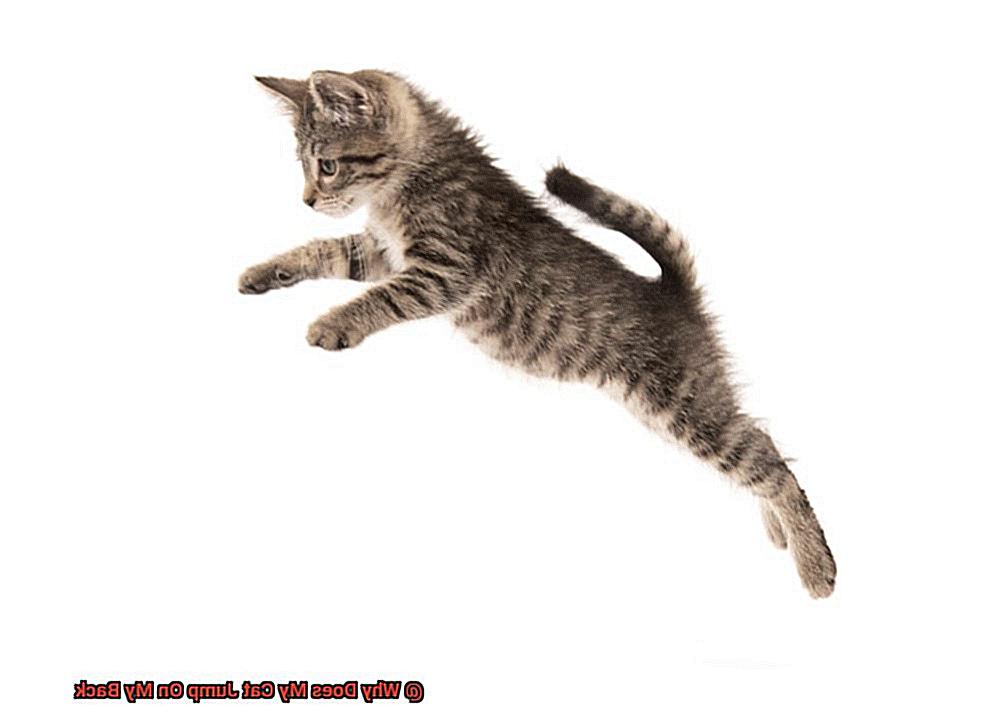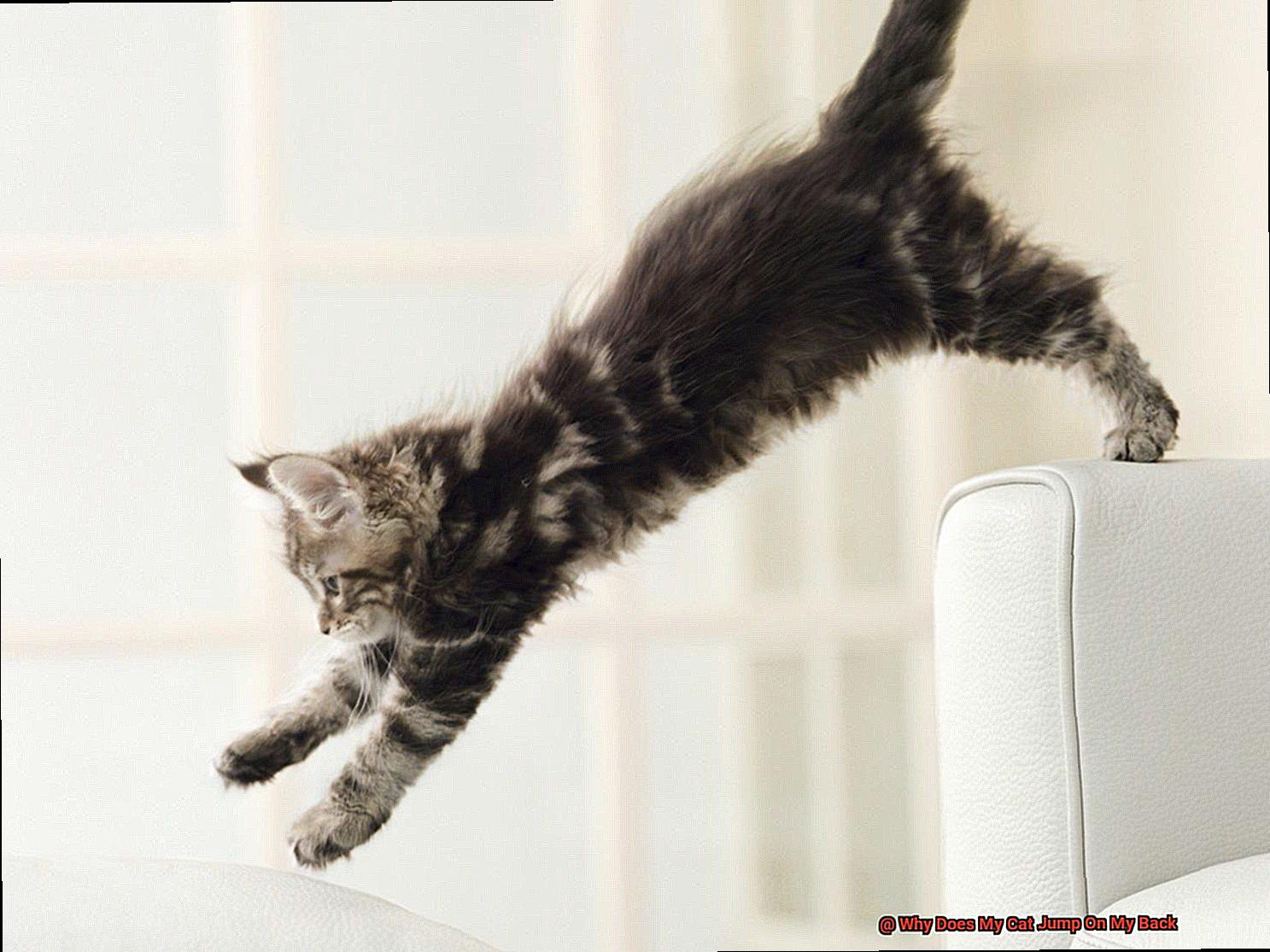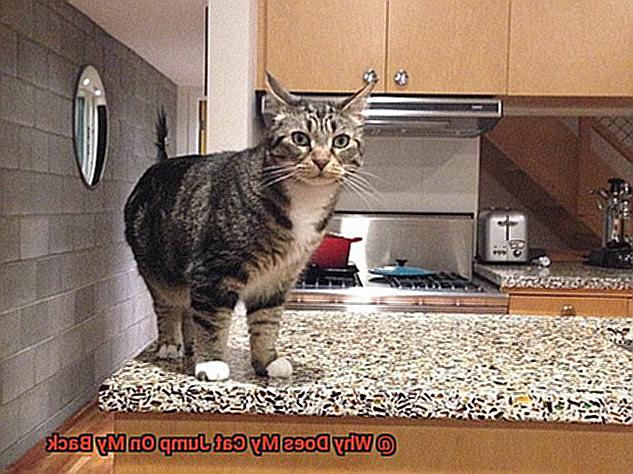If you’re a cat parent, you know that your furry friend can be both mysterious and fascinating.
One of the most curious behaviors that cats exhibit is jumping on their human’s back. While some might find it endearing, others may feel like they’re carrying a 10-pound weight on their shoulders.
So why does your cat do this? Firstly, let’s take a look at cats in their natural habitat.
Climbing trees is second nature to them as it allows them to escape predators or hunt prey. Jumping on your back might just be an extension of this innate behavior – a playful way for your cat to explore their environment.
Secondly, cats are social creatures who crave attention and physical closeness with their humans. When your cat jumps on your back, it could be a sign of affection and an attempt to get closer to you.
It’s their way of saying “I love you” in feline language. Thirdly, cats have scent glands in their paws which they use to mark their territory.
By jumping on your back, they could be leaving behind their scent as a way of claiming you as theirs. It’s like wearing a badge that says “I belong to my human.”
Lastly, jumping on your back could be your cat’s way of dealing with stress or anxiety. Physical touch has been proven to have calming effects on both humans and animals alike.
Your cat might seek comfort in being close to you when they’re feeling overwhelmed. In conclusion, understanding the reasons behind why your cat jumps on your back can help deepen the bond between you and your feline friend.
So next time you feel those tiny paws land on your shoulders, enjoy the moment knowing that it’s just another way that cats show us how much they care about us.
Cats Jump On Your Back To Seek Attention
Don’t worry, it’s not an attack – it’s just their way of saying, “Hey, I need some attention here.”
Cats are social creatures and thrive on human interaction. Jumping on your back is one of the many ways they seek attention or affection from their beloved owners.
It could also mean that they want to play with you or just be close to you. So, the next time your cat jumps on your back, take it as a sign of endearment and spend some quality time with them.
However, if your cat is repeatedly jumping on your back aggressively or too frequently, it could be a sign of dominance. In the wild, cats establish hierarchy by taking control of high places.
By jumping on your back, they may be trying to assert their dominance. If this is the case, it’s important to set boundaries and discourage this behavior to avoid any potential danger.
On the other hand, if your cat is jumping on your back out of fear or anxiety, it is essential to identify the cause of their distress and provide them with a safe and secure environment. Your cat might be feeling scared or anxious and needs your comfort and security.
Remember, every cat has its own unique personality, preferences, and temperament. Not all cats enjoy being carried or picked up.
Some may find it uncomfortable or scary and may lash out by scratching or biting. Therefore, understanding your cat’s body language and personality is crucial before attempting to pick them up or carry them around.
It’s important to understand the reason behind their behavior and respond accordingly.
Cats Jump On Your Back To Assert Dominance
One behavior that may indicate this is when your feline friend jumps on your back to assert dominance.
Cats are instinctively territorial animals that are always trying to establish their dominance over their surroundings. When they jump on your back, it’s a clear sign that they view you as inferior and want to show off their power.
However, not all cats exhibit this behavior and it can vary from cat to cat. If you notice that your cat is consistently jumping on your back, it’s important to address the behavior to prevent any potential injuries or discomfort.
To discourage this behavior, try redirecting their attention with toys or treats. Positive reinforcement techniques such as praise and affection when they exhibit good behavior can also be effective.
Additionally, establishing boundaries through verbal commands and gently removing them from your back can help prevent future incidents. It’s essential to note that cats may also jump on your back to showcase their physical abilities which are highly valued in the feline world.

So next time your cat tries to jump on your back, remember that it’s not always about asserting dominance but also an opportunity for them to display their strength and agility.

So, cats jump on their owners’ backs for various reasons, including asserting dominance and showcasing their physical abilities.
Cats May Jump On Your Back Out Of Fear Or Anxiety
While this behavior can be perplexing, it’s important to understand that cats may jump on your back out of fear or anxiety.
Despite their reputation for independence, cats experience a range of emotions, including fear and anxiety. When they feel overwhelmed, they may instinctively seek refuge on their owner’s back as a way to feel protected and secure.
This behavior can be triggered by various situations. One reason why cats may jump on your back out of fear or anxiety is due to a lack of socialization.
If your cat hasn’t been properly socialized, they may become easily frightened by new people or environments. In these cases, jumping on your back can provide them with a sense of safety and protection.
Another reason why cats may jump on your back out of fear or anxiety is due to past traumas. Cats that have experienced abuse, neglect, or other traumatic events may be more prone to anxiety and fear.
Jumping on their owner’s back can provide them with a sense of security and comfort during times of distress. It’s important to note that jumping on your back can also be a sign of aggression in some cats.
If this behavior is accompanied by aggressive actions, it’s crucial to seek the help of a veterinarian or animal behaviorist. To prevent your cat from jumping on your back out of fear or anxiety, it’s essential to create a safe and comfortable environment for them.
This includes providing plenty of hiding spots, toys, and scratching posts. Additionally, spending time socializing your cat and exposing them to new experiences in a controlled manner can help them feel more comfortable in new situations.
Understanding why this behavior is happening can help pet owners develop strategies to prevent it from occurring in the future.
How to Discourage Unwanted Behavior
Whether it’s jumping on your back or scratching the furniture, these behaviors can be frustrating and even dangerous. However, it’s essential to remember that punishment does not work with cats.
Instead, positive reinforcement and alternative behaviors are the keys to discouraging unwanted behavior in cats. Here are five effective strategies that you can use to discourage unwanted behavior in your furry friend.
Understanding the Reasons Behind Unwanted Behavior

The first step in discouraging unwanted behavior is understanding why your cat is engaging in it. Cats are complex creatures, and their behavior can be influenced by various factors such as boredom, anxiety, or seeking attention.
By identifying the underlying reason behind their actions, you can take appropriate action and provide them with the care and attention they need.

For instance, if your cat is jumping on your back to seek attention, try spending more quality time with them.
Providing Alternative Behaviors
Cats love to climb and perch, so providing them with alternative spots to do so can help reduce unwanted behavior. For example, a tall scratching post or a window perch can serve as a perfect alternative for your cat to climb on instead of your back.
Additionally, providing plenty of toys and mental stimulation throughout the day can keep your cat entertained and less likely to engage in unwanted behavior.
Addressing Underlying Issues

Addressing any underlying issues that may be causing unwanted behavior is crucial. If your cat is jumping on your back due to anxiety or boredom, addressing those issues can help reduce the behavior.
You may consider consulting with a professional behaviorist or a veterinarian to identify any underlying medical conditions that may be contributing to the behavior.
Subtopic Heading: Consistency is Key

Consistency is essential when it comes to discouraging unwanted behavior in cats. Establish clear boundaries and ensure that everyone in the household responds to the behavior in the same way.
For instance, if you’re trying to discourage your cat from jumping on your back, make sure that everyone in the house responds the same way when they try to jump on their backs. Consistency helps your cat understand what is expected of them and reinforces good behavior.
Subtopic Heading: Using Positive Reinforcement
Positive reinforcement is an effective strategy for discouraging unwanted behavior in cats.
Reward your cat with treats or praise when they exhibit appropriate behavior, such as using their designated climbing area instead of your back. Positive reinforcement helps to reinforce good behavior and encourages your cat to continue it.
In conclusion, discouraging unwanted behavior in cats requires patience, consistency, and understanding. By implementing these strategies, you can create a happier and healthier home for both you and your feline friend.
Tips For Providing Comfort and Security To Anxious Cats
If you’re struggling with an anxious cat, don’t worry
there are several tips you can use to help calm them down and prevent this behavior.
Create a Safe Space
Providing your cat with a designated area where they can retreat when they feel overwhelmed is essential. This could be a cozy bed, a cardboard box, or even a quiet room with hiding spots. Ensure that the space is comfortable and away from any loud noises or disturbances.

Use Pheromone Products
Pheromone products like Feliway mimic the natural pheromones cats release when they feel safe and secure. By using these products in your home, you can create a familiar and calming environment for your cat.
Play Therapy
Regular playtime and exercise provide cats with an outlet for their energy and help keep them stimulated mentally and physically. Use interactive toys such as wand toys or laser pointers to engage your cat in playtime.
Provide Vertical Space
Cats feel more secure when they have access to elevated spaces such as cat trees or shelves where they can observe their surroundings from above. This can also provide mental stimulation and physical activity.
Stick To A Routine
Establishing a routine for feeding, playtime, and other activities can help reduce anxiety in cats by providing predictability and stability.

In addition to these tips, providing your cat with plenty of love and attention can go a long way in reducing their anxiety levels. Spending quality time with your cat, petting them, and talking to them can all help make them feel more secure and less anxious.
Remember, every cat is unique, so it may take some trial and error to find what works best for your furry friend.
dklFk71eZNQ” >
Understanding Why Your Cat Is Doing This
It can be quite the surprise, but understanding the reasons behind this behavior is crucial in managing and preventing it.
One reason why cats may jump on their owner’s back is to seek attention. As social animals, cats crave attention from their owners.
If they feel ignored or neglected, jumping on their owner’s back is a way to get their attention and affection. Another possible reason for this behavior is playfulness.

Cats are known for their playful nature, and they may jump on their owner’s back as a way of initiating playtime. They may also do it out of curiosity, as climbing on their owner’s back gives them a new perspective on their surroundings.
However, it is important to note that some cats may jump on their owner’s back as a sign of aggression or dominance. This behavior is more common in unneutered male cats or cats that have not been properly socialized.
If this behavior persists or becomes aggressive, it is important to seek the advice of a veterinarian or animal behaviorist to address the issue. To prevent this behavior, it is essential to provide your cat with appropriate outlets for play, attention, and curiosity.
In conclusion, understanding why your cat jumps on your back is an essential step in addressing this behavior.
Also Read: Why Do Cats Crab Walk?
Conclusion
To sum it up, cats are intriguing creatures that possess unique behaviors, such as jumping on their owner’s back.
This action may be due to a variety of reasons, including playfulness, seeking attention, asserting dominance, and managing stress or anxiety. By comprehending the root cause of this behavior, you can cultivate a stronger bond with your feline companion.
If your cat jumps on your back too aggressively or too often, it could be an indication of dominance. Conversely, if they do so because of fear or anxiety, it is crucial to determine the source of their distress and provide them with a secure and comfortable environment.
Curbing undesirable behavior in cats necessitates patience, consistency, and empathy. Positive reinforcement and alternative activities are effective techniques for discouraging unwanted behavior in cats.
In conclusion, understanding why your cat jumps on your back is critical in managing and preventing this conduct.







